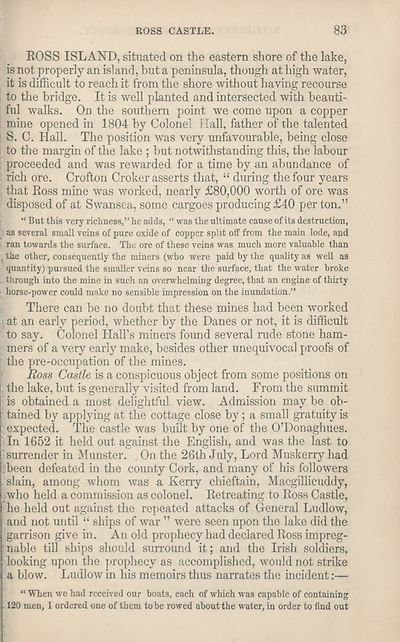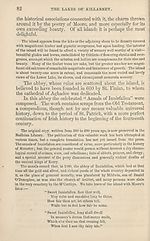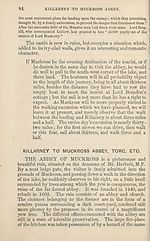Download files
Complete book:
Individual page:
Thumbnail gallery: Grid view | List view

ROSS CASTLE.
83
[ _ KOSS ISLAND, situated on the eastern shore of the lake,
is not properly an island, but a peninsula, though at high water,
it is difficult to reach it from the shore without having recourse
j to the bridge. It is well planted and intersected with beauti-
; ful walks. On the southern point we come upon a copper
! mine opened in 1804 by Colonel TIall, father of the talented
i S. C. Hall. The position was very unfavourable, being close
I to the margin of the lake ; but notwithstanding this, the labour
1 proceeded and was rewarded for a time by an abundance of
? rich ore. Crofton Croker asserts that, “ during the four years
i that Ross mine was worked, nearly £80,000 worth of ore was
’ disposed of at Swansea, some cargoes producing £40 per ton.”
j “But this very richness,” he adds, “was the ultimate cause of its destruction,
:! as several small veins of pure oxide of copper split off from the main lode, and
' ran towards the surface. The ore of these veins was much more valuable than
; the other, consequently the miners (who were paid by the quality as well as
quantity) pursued the smaller veins so near the surface, that the water broke
I through into the mine in such an overwhelming degree, that an engine of thirty
K horse-power could make no sensible impression on the inundation.”
j, There can be no doubt that these mines had been worked
| at an early period, whether by the Danes or not, it is difficult
to say. Colonel Hall’s miners found several rude stone ham-
! mers of a very early make, besides other unequivocal proofs of
\ the pre-occupation of the mines.
f Boss Castle is a conspicuous object from some positions on
: the lake, but is generally visited from land. From the summit
j is obtained a most delightful view. Admission may be ob-
itained by applying at the cottage close by; a small gratuity is
^expected. The castle was built by one of the O’Donaghues.
In 1652 it held out against the English, and was the last to
j surrender in Munster. . On the 26th July, Lord Muskerry had
Sheen defeated in the county Cork, and many of his followers
.■slain, among whom was a Kerry chieftain, Macgillicuddy,
jwho held a commission as colonel. Retreating to Ross Castle,
i he held out against the repeated attacks of General Ludlow,
; and not until “ ships of war ” were seen upon the lake did the
"garrison give in. An old prophecy had declared Ross impreg¬
nable till ships should surround it; and the Irish soldiers,
i looking upon the prophecy as accomplished, would not strike
;a blow. Ludlow in his memoirs thus narrates the incident:—
“ When we had received our boats, each of which was capable of containing
120 men, I ordered one of them to be rowed about the water, in order to find out
83
[ _ KOSS ISLAND, situated on the eastern shore of the lake,
is not properly an island, but a peninsula, though at high water,
it is difficult to reach it from the shore without having recourse
j to the bridge. It is well planted and intersected with beauti-
; ful walks. On the southern point we come upon a copper
! mine opened in 1804 by Colonel TIall, father of the talented
i S. C. Hall. The position was very unfavourable, being close
I to the margin of the lake ; but notwithstanding this, the labour
1 proceeded and was rewarded for a time by an abundance of
? rich ore. Crofton Croker asserts that, “ during the four years
i that Ross mine was worked, nearly £80,000 worth of ore was
’ disposed of at Swansea, some cargoes producing £40 per ton.”
j “But this very richness,” he adds, “was the ultimate cause of its destruction,
:! as several small veins of pure oxide of copper split off from the main lode, and
' ran towards the surface. The ore of these veins was much more valuable than
; the other, consequently the miners (who were paid by the quality as well as
quantity) pursued the smaller veins so near the surface, that the water broke
I through into the mine in such an overwhelming degree, that an engine of thirty
K horse-power could make no sensible impression on the inundation.”
j, There can be no doubt that these mines had been worked
| at an early period, whether by the Danes or not, it is difficult
to say. Colonel Hall’s miners found several rude stone ham-
! mers of a very early make, besides other unequivocal proofs of
\ the pre-occupation of the mines.
f Boss Castle is a conspicuous object from some positions on
: the lake, but is generally visited from land. From the summit
j is obtained a most delightful view. Admission may be ob-
itained by applying at the cottage close by; a small gratuity is
^expected. The castle was built by one of the O’Donaghues.
In 1652 it held out against the English, and was the last to
j surrender in Munster. . On the 26th July, Lord Muskerry had
Sheen defeated in the county Cork, and many of his followers
.■slain, among whom was a Kerry chieftain, Macgillicuddy,
jwho held a commission as colonel. Retreating to Ross Castle,
i he held out against the repeated attacks of General Ludlow,
; and not until “ ships of war ” were seen upon the lake did the
"garrison give in. An old prophecy had declared Ross impreg¬
nable till ships should surround it; and the Irish soldiers,
i looking upon the prophecy as accomplished, would not strike
;a blow. Ludlow in his memoirs thus narrates the incident:—
“ When we had received our boats, each of which was capable of containing
120 men, I ordered one of them to be rowed about the water, in order to find out
Set display mode to:
![]() Universal Viewer |
Universal Viewer | ![]() Mirador |
Large image | Transcription
Mirador |
Large image | Transcription
| Antiquarian books of Scotland > Ireland/Irish > Black's guide to Killarney and the south of Ireland > (95) |
|---|
| Permanent URL | https://digital.nls.uk/118861808 |
|---|
| Description | Thousands of printed books from the Antiquarian Books of Scotland collection which dates from 1641 to the 1980s. The collection consists of 14,800 books which were published in Scotland or have a Scottish connection, e.g. through the author, printer or owner. Subjects covered include sport, education, diseases, adventure, occupations, Jacobites, politics and religion. Among the 29 languages represented are English, Gaelic, Italian, French, Russian and Swedish. |
|---|

